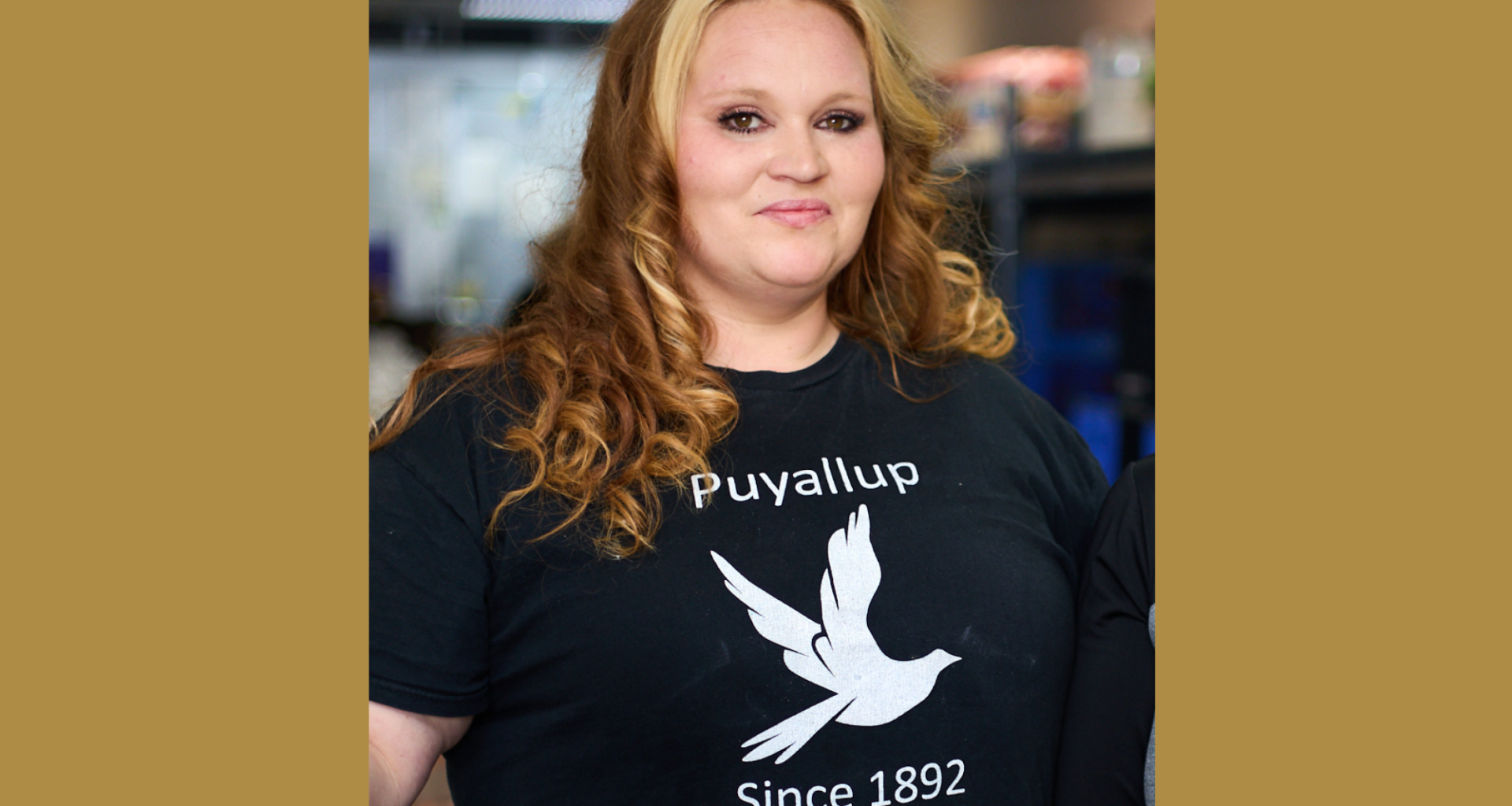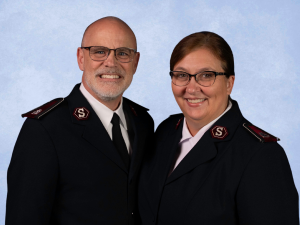Lately, here on this show, we’re exploring what happens when hope moves from feeling to doing, from possibility to practice. And today, we’re continuing our journey inside one of The Salvation Army’s recent transformations: Hope Markets.
As we covered in our recent “Hope in Action” issue of the magazine, these aren’t your typical food pantries. In Hope Markets across the Northwest, people don’t receive pre-packed boxes—they shop for their own groceries, selecting fresh produce under gentle misters, browsing grocery-style shelves and building relationships along the way.
It’s meeting need in a more personal way when the need is great. Right now, more than 47 million people in the U.S. face hunger, including 1 in 5 children, according to the USDA. And in one recent year alone, more than 50 million people turned to charitable food assistance for extra help.
Hope Markets are helping to transform that assistance as individuals come and shop for their own food. Across the Northwest Division, Hope Markets served more than 457,000 people in 2024.
But to understand the real impact of this model, we need to talk with someone who’s lived both sides of the experience.
Stacy Bleuel is the Social Services Coordinator at The Salvation Army in Puyallup, Washington. Years ago, she arrived at their doors—not as an employee, but as someone seeking help. Homeless, grieving and struggling to care for her three children, Stacy came through a state assistance program.
Today, she runs the Hope Market in the very place that once helped her rebuild her life.
In the magazine, Stacy told us: “Success is when people walk out with a basket full of food, when kids aren’t going hungry.”
She knows what it’s like to run out of food stamps and be worried about where her kids’ next meal would come from.
And her journey from Salvation Army food recipient to janitor to program coordinator isn’t just inspiring—it’s a living example of what’s possible when we create spaces where hope is both given and received.
Head to caringmagazine.org/hope to read our story about the Hope Markets transformation, and listen in here as Stacy shares more about her story and how she is now helping others one shopping trip at a time.
Show highlights include:
- Stacy’s journey to social services coordinator.
- How her background influences her work with people through The Salvation Army today.
- What The Salvation Army offers through the Hope Market.
- The transition from traditional food pantry to client-choice model.
- A moment Stacy could feel the impact on her community.
- How relationships go deeper than simple food assistance.
- What she envisions for the future.
- What Stacy would say to someone in need of help.
Listen and subscribe to the Do Gooders Podcast now. Below is a transcript of the episode, edited for readability. For more information on the people and ideas in the episode, see the links at the bottom of this post.
* * *
Stacy Bleuel: My name is Stacy Bleuel. My title right now is Social Service Coordinator. I pretty much do everything around here except for preach.
Christin Thieme: No shortage of things to do then, I’m sure. So you started there at the corps with The Salvation Army as a janitor—can you share a little bit about your journey to social services coordinator?
Stacy Bleuel: Well, actually how I came across The Salvation Army for the very first time was a program through the state getting benefits back in 2015. They’re the ones that really moved with my work ethic, caring for people, but it was when my program ended and left and I begged to stay. They didn’t have any job openings. But then in 2018, Marita who was running paid social services, sent me an email, said, “Guess what? There’s a janitor position, you better get in here.” That’s when I came and gave them my application… and I was hired as a janitor.
So when I first got here, the officers that were running the corps, they were older, getting ready to retire, and then the Kelly’s came in. And they’re the ones who really changed my life totally around. I’d went from not believing in God anymore. That’s my past and trauma there, they are the ones that made me want to give myself to God when they showed me how to care for people and help people and not to spite you and I’m still there today.
Christin Thieme: And 10 years later, you’re still here. How do you think your own personal background influences the way that you approach your role in working with people through The Salvation Army today?
Stacy Bleuel: Because I’ve been there. I’ve been homeless with my kids living in a van. I’ve had domestic violence. My parents had a background with drug use when I was growing up, so I’ve been in every aspect of what my clients go through every day. So I can say when they come in, they feel uncomfortable and shy to talk about things. I tell them my story and I’m like, “Hey, it’s okay. This is a safe place. I’m not judging you. What’s going on in your life?” And so that really helps them open up.
Christin Thieme: Yeah, I’m sure that makes a big difference. For anyone who hasn’t read the magazine article and more about the Hope Markets across the whole of Northwest, can you explain when somebody comes in, what are they looking for? What do you do? What does The Salvation Army offer? What is a Hope Market?
Stacy Bleuel: Our Hope Market, we just officially cut the ribbon on Friday, but our Hope Market is a place to go for those who are in need of food resources, whether it be housing, utility assistance, pastoral care, clothing, and our doors are just open. They can come in and I try to make it as much like a grocery store as possible so they’re comfortable. They get to shop for their own groceries. We’re open just once a week. We’re pretty much a pantry right now with utility assistance.
Christin Thieme: And you’ve just transitioned from being more of a traditional food pantry into this hope market model, right? Where it’s more of a grocery store. You mentioned, you just cut the ribbon. What do you expect to see in that change? What is the shift there?
Stacy Bleuel: It makes people feel or not so embarrassed to come. It makes them proud when they walk out of the door because they’re coming home with groceries for the family instead of empty cupboards. So that’s what we’re really shooting for.
Christin Thieme: I know you’ve described the success for you of it when people walk out with that basket full of food when kids aren’t going hungry. Can you share a moment from your experience in your role when you knew that what The Salvation Army does is making an impact?
Stacy Bleuel: My son came to work with me yesterday… and there’s this gentleman, he comes in every week, he’s homeless at the time, and he is just so polite. He comes in and I feel terrible because he always leaves me with a little amount of food because he has no means of cooking, things like that. But last night when I got home, my son was like, “Mom, you know that guy that sits on the curb?” He was like, “He’s so appreciative of you guys and he gets the littlest amount of food, but he’s so grateful and what you guys do made his whole day.”
And my son’s only 13. And for him to recognize that, it gave me goosebumps because there’s sometimes when being in this position kind of gets hard, wears on your heart, because there is people that are ungrateful, but it’s when kids come in shopping with their parents, you get to give them a little treat, and they’re so excited for the mom that was just so proud of them and walking out the door so grateful. We saved her so much stress. She doesn’t feel like such a bad parents because she’s able to provide for her kids. I’ve seen families walk out with full baskets of groceries. That’s how I know we can take it there.
Christin Thieme: And there’s some, that relationship goes even deeper. We tell the story in the magazine piece about a woman named Maricel who you’ve developed a relationship with. She came in after the unfortunate death of her husband. What are those deeper relationships with people that, I mean, you’re assisting with the basic food, right? I mean, it’s very straightforward, but what are those deeper relationships teach you about the role that we’re playing in people’s lives?
Stacy Bleuel: Making a big impact. I mean, Maricel came in here, I didn’t even know her, never met her before. One of her friends brought her in. She was coming in for assistance and Maricel was just coming to tag along. And as we were waiting I hear Maricel start getting upset, talking to my mom, who ran the reception desk. So I run out there and I’m like, “What’s going on?” And so my mom told me, because at this point Maricel was balling and it had only been maybe two days since her husband had passed away. And first thing I did was I just hugged her. I grabbed her and I told her, “Listen, I got you, girl. I’m going to help you through this.” And so, Maricel takes her story, she tells the people in the community and not only do say donors, it makes an impact on them and they want to help people. And then she tells us who are need of papers they come in from, our help and they go to the tell next person, to the next person, to the next person. And it’s changing lives.
Christin Thieme: What kind of feedback do you get from the broader community?
Stacy Bleuel: We get love. And this is great. We see people all the time. We go to a Christmas party, people take their stamps for us at The Salvation Army. I go to the grocery store, I wear my shirt and people are like, “Oh, you work at The Salvation Army? They changed our lives.” We went to treatment, Christmas gifts, our community is more than welcome.
Christin Thieme: What do you envision for the future now of the newly opened Hope Market in Puyallup? What are the things that you would like to see happen?
Stacy Bleuel: I’d like to see us be able to expand more out in the community, get out to the areas we don’t reach. And I just want to see the community come together. Hopefully, keep spreading the impact that we make.
Christin Thieme: You said you know what it’s like to be there. For somebody listening who might be in that position right now, what would you want them to know?
Stacy Bleuel: Don’t be scared to ask for help. Don’t be embarrassed. That’s what we’re here for. The sooner you do it, the quicker you’re going to get out of your situation and the happier you’ll be.
Christin Thieme: And finally, Stacy, what is giving you hope right now?
Stacy Bleuel: I have a lot of things giving me hope. The next family that’s going to walk through the store, the smiling faces of kids and the good neighbors. Yeah, really it’s just the people in the community. I just hope that I can change somebody’s life, whether it be tomorrow, a week from now, so I can just keep the chain going.
Additional resources:
- If you are one of the hopefuls, get on the list for the Do Good Digest, our free 3-minute weekly email newsletter used by more than 20,000 hopefuls like you for a quick pick-me-up in a busy day.
- If you are enjoying this show and want to support it, leave a rating and review wherever you listen to help new listeners hit play for the first time with more confidence.
- If you want to help The Salvation Army serve more than 27 million Americans in need each year, give today. Your gift of money, goods or time helps The Salvation Army do good all year in your community.
Listen and subscribe to the Do Gooders Podcast now.












